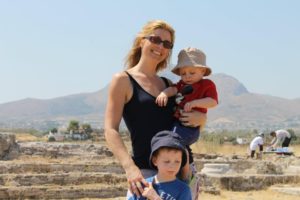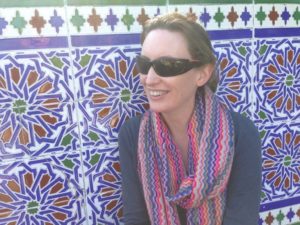International Women’s Day – profiles
To mark International Women’s Day, we asked some of our leading female academics what inspires them and what advice they would give to women and young girls looking to pursue a career in academia…
Rebecca Sweetman, Professor of Ancient History and Archaeology, School of Classics
 |
| To hear Rebecca speaking about her research click here. |
Rebecca graduated with a degree from University College Dublin in Archaeology and Classics. She spent a year on the excavation circuit and then started her PhD on Roman and Early Christian Mosaics of Crete at the University of Nottingham, spending most of her time in Athens and Crete. After a series of temporary jobs at the BSA (including Knossos Curator and Archivist Rebecca became Assistant Director of the BSA before coming to St Andrews as a lecturer in Ancient History and Archaeology in 2003.
What was your childhood ambition?
I have wanted to be an archaeologist from as early as I can remember. There was a short-lived phase of wanting to be a vet but digging in the dirt was clearly more appealing than digging anywhere else…
What inspired you to get involved in archaeology?
I grew up surrounded by archaeology. My father is an archaeologist and we spent our school holidays on site in some form. When I went to university I was lucky enough to be able to spend my summers on archaeological projects in Ireland and Greece. Before I actually began working there, I hadn’t even considered working in Greece; I assumed incorrectly that it was for a privileged few. However, while working there I met a number of inspiring archaeologists from all sorts of backgrounds who made it clear, by their example, that a career in Greek archaeology is possible. The nature of archaeological fieldwork means that you get to know your colleagues really well, and there is a great natural sense of mentorship in the discipline. As an undergraduate student, a combination of my father and the people I worked for on fieldwork quietly encouraged and demonstrated the potential for following a career that you really enjoyed. As a postgraduate student working in Athens, I was inspired by fellow students, colleagues and visiting researchers to think broadly and see the wider views of the research I was involved in. While in Athens, the wonderful library ladies were a constant source of advice and inspiration and since coming to St Andrews I have been supported and encouraged by colleagues and leaders in my field. That so many people have given their time and guidance so generously and thoughtfully is hugely inspiring.
Who is your female icon?
Traditionally women have been rather left out of the history of archaeology. At the turn of the century it was famously difficult for them to be taken seriously as field directors… it was believed that they were better suited for jobs such as dealing with pottery, archives or libraries. Archaeologists such as Kathleen Kenyon (excavator at Jericho) and Harriet Boyd-Hawes (excavator at Gournia, Crete) paved the way for women to be taken seriously as project directors. While the majority are still men, the more female site directors there are, the more women are encouraged to aspire to these roles. In the last few decades archaeology has seen the rise of some awesome women; in my field, Sue Alcock (Professor of Classical Archaeology and Classics at Michigan and leader in survey archaeology), Mary Beard (Professor of Classics at Cambridge), Sue Black (Professor of Anatomy and Forensic Anthropology at Dundee) and Cathy Morgan (Professor of Classics and Archaeology at Oxford and previously director of the British School of Archaeology) have set new agendas, methods and standards in the discipline and in doing so are an inspiration for a whole new generation of women in archaeology and classics. Importantly, these women have been important role models in terms of making archaeology and classics accessible and attractive to a wide audience.
What is the most rewarding part of your job?
Fieldwork, research and chatting with colleagues is always fun and inspiring. However, I love to teach and it is particularly rewarding when our students carry on with careers or postgraduate work connected with archaeology. So much of archaeology is about gaining experience and I try to support our students in their endeavours to gain excavation, museum, archive placements. A decade ago I set up an honours module to take students to Greece which involves teaching and presentations at around 30 sites and museums. Students work hard on this module which is quite research focused and the value they get from the module is hugely motivating! Students say how what they have learned in class really falls into place having visited the sites. Every year we have a few students who are so inspired by being on site that they change their degrees to focus on archaeology; many students go on to do postgraduate work in archaeology and all have a fantastic time!
What advice would you give to females and young girls who may be interested in pursuing a career in your field?
Archaeology is a great career and one doesn’t need to have a beard to be an archaeologist. If you are interested and inspired by it, it is possible to have a good and rewarding career in archaeology no matter what your background or future aspirations. Talk to lots of people about their experiences, get advice and collect lots of different skills along the way.
Catherine O’Leary, Reader in Spanish, School of Modern Languages
Catherine studied International Marketing and Languages at Dublin City University before going on to complete a PhD in Spanish literature at University College Dublin. She lectured at the National University of Ireland, Maynooth from 2000 until moving to St Andrews in 2013. She is currently Head of the Department of Spanish and Associate Dean of Arts and Divinity. Her research focuses on four main areas: contemporary Spanish theatre, censorship, gender and identity, and exile and cultural memory.
What was your childhood ambition?
I didn’t have a clear goal – my ambitions changed over time. When I was very young, I wanted to solve mysteries; I later dreamt of being a writer, an artist, a lawyer… I guess that some of this fed into my work, which involves writing, examining censorship legislation, and sometimes even detective work in archives!
What inspired you to get involved in Spanish?
I wasn’t sure what I wanted to do when I finished school. I seriously considered going to Art college; I thought about law; I was attracted to English and History, but persuaded by the trendiness of ‘marketing’ at the time, I opted for a course that involved business and languages. I enjoyed, but was not inspired by, business studies and – crucially – was disappointed to find that the language element was mostly non-literary. I stayed the course, had a fantastic year abroad in Spain and realised that I loved both literature and university life. This path eventually led me to literary studies and to a PhD in Spanish, although my business background is surprisingly useful at times.
Who is your female icon?
Mary Robinson, former Irish President. She is an inspirational figure and was a game-changer in terms of Irish politics and in Irish social life.
What is the most rewarding part of your job?
It’s hard to pick any one thing. One of the joys of the job is the fact that it is multifaceted. I love teaching and am genuinely interested both in what students have to say and in having my own thinking challenged: I am always learning too. I love getting stuck into a research project, be it on literary reflections of gender, memory and exile or on theatre censorship, and considering what that can tell us about society and humanity. I even mostly like the administrative side of things and learning how this institution works. It’s a privilege to work in an environment where I am encouraged to develop several different skillsets, where I can read literature and call it my job, and where I meet and engage with (mostly) intelligent people all day.
What advice would you give to females and young girls who may be interested in pursuing a career in your field?
Go for it! But be aware that there is luck involved, as well as lots of hard work. Speak to those who are already in the field and attend seminars and talks if you can – don’t assume that they are only for staff or postgraduates.
